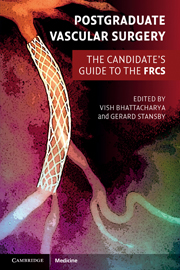Book contents
- Frontmatter
- Contents
- List of contributors
- Preface
- Section 1 Final FRCS vascular clinicals
- Section 2 Final FRCS vascular topics
- 1 Vascular risk factors and their management
- 2 Management of acute limb ischaemia
- 3 Chronic lower limb ischaemia, critical ischaemia and the diabetic foot
- 4 Endovascular and surgical options for peripheral revascularisation
- 5 Abdominal aortic aneurysms
- 6 Thoracic, thoracoabdominal and suprarenal aortic aneurysms
- 7 Aortic dissection
- 8 Popliteal artery aneurysms
- 9 Femoral artery aneurysms
- 10 Carotid, subclavian and vertebral disease
- 11 Diagnosis and management of thoracic outlet syndrome
- 12 Diagnosis and management of hyperhidrosis
- 13 Chronic mesenteric ischaemia
- 14 Acute ischaemic colitis
- 15 Vascular trauma
- 16 Indications and management of lower limb amputation
- 17 Leg swelling and lymphoedema
- 18 Varicose veins and chronic venous insufficiency
- 19 Management of deep vein thrombosis
- 20 Infection in vascular surgery
- 21 Vascular malformations
- 22 Vasospastic disorders and vasculitis
- 23 Critical care considerations and preoperative assessment for general and vascular surgery
- 24 Access surgery
- 25 Basic outline of solid organ transplantation
- Index
- References
13 - Chronic mesenteric ischaemia
- Frontmatter
- Contents
- List of contributors
- Preface
- Section 1 Final FRCS vascular clinicals
- Section 2 Final FRCS vascular topics
- 1 Vascular risk factors and their management
- 2 Management of acute limb ischaemia
- 3 Chronic lower limb ischaemia, critical ischaemia and the diabetic foot
- 4 Endovascular and surgical options for peripheral revascularisation
- 5 Abdominal aortic aneurysms
- 6 Thoracic, thoracoabdominal and suprarenal aortic aneurysms
- 7 Aortic dissection
- 8 Popliteal artery aneurysms
- 9 Femoral artery aneurysms
- 10 Carotid, subclavian and vertebral disease
- 11 Diagnosis and management of thoracic outlet syndrome
- 12 Diagnosis and management of hyperhidrosis
- 13 Chronic mesenteric ischaemia
- 14 Acute ischaemic colitis
- 15 Vascular trauma
- 16 Indications and management of lower limb amputation
- 17 Leg swelling and lymphoedema
- 18 Varicose veins and chronic venous insufficiency
- 19 Management of deep vein thrombosis
- 20 Infection in vascular surgery
- 21 Vascular malformations
- 22 Vasospastic disorders and vasculitis
- 23 Critical care considerations and preoperative assessment for general and vascular surgery
- 24 Access surgery
- 25 Basic outline of solid organ transplantation
- Index
- References
Summary
Key points
Chronic mesenteric ischaemia (CMI) is a rare condition, accounting for less than 5% of all intestinal ischaemic events
More than 90% of cases are due to atherosclerotic occlusion or severe stenosis
Classic symptoms include postprandial abdominal pain, sitophobia and weight loss
At least two of the three main splanchnic arteries must be significantly compromised to result in chronic mesenteric ischaemia
Duplex ultrasonography is non-invasive and expedient but may miss up to 20% of vascular lesions in the coeliac trunk
Computed tomography angiography (CTA) and magnetic resonance angiography (MRA) are equally excellent non-invasive modalities with highly accurate diagnosis of vascular disease in the coeliac axis (CA) and superior mesenteric artery (SMA) and replace conventional catheter angiography
Conventional catheter angiography should be reserved for diagnosis of CMI only when other modalities have been unhelpful or if intervention such as percutaneous transluminal angioplasty (PTA) is planned
Surgical vascular bypass is the traditional definitive therapy for CMI with an overall 5-year graft patency of 78%
Endovascular therapy is optimal in short segment atherosclerotic lesions at the ostia of the SMA and CA. Stenting and PTA in short-term follow up have a clinical benefit with stent patency in more than 90% of cases
Background
CMI is an uncommon cause of abdominal pain. It accounts for 5% of all intestinal ischaemic events with acute ischaemia being much more common.
- Type
- Chapter
- Information
- Postgraduate Vascular SurgeryThe Candidate's Guide to the FRCS, pp. 156 - 163Publisher: Cambridge University PressPrint publication year: 2011

